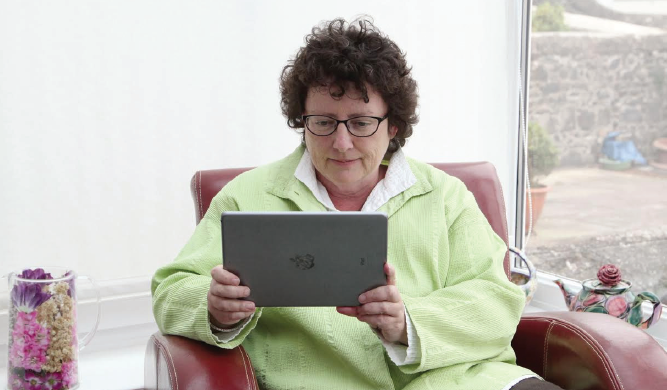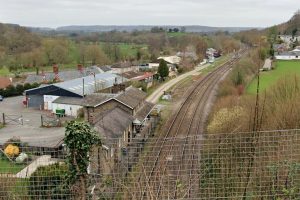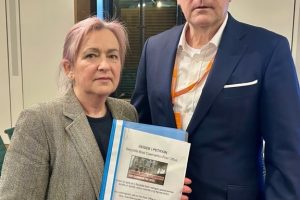
CEREDIGION AM Elin Jones has raised serious concerns about broadband in the county, seeking to make it a priority for Superfast Cymru. Figures just released reveal that only 60% of homes in Ceredigion which are eligible for Superfast Broadband had been completed by this summer. The figures from the Welsh Government placed Ceredigion second from last in all Local Authorities in Wales for Superfast installation. Almost £6 million has been spent by Superfast Cymru in Ceredigion but this is less than half of that which has been spent on neighbouring rural communities in Pembrokeshire, Carmarthenshire, Gwynedd and Powys, which each averaged between £12 and £14 million.
Elin Jones said: “I’m seeking an urgent meeting with the Cabinet Secretary overseeing the roll out of Superfast Broadband across Wales. This is simply not good enough. I am extremely concerned about these figures, and will be seeking answers from the Government on the issue. Ceredigion seems to have been left behind in the rollout process. It has had comparatively less money spent by Superfast Cymru than that spent in similar rural areas, and the results show this. I am constantly hearing from constituents about poor broadband speeds and whole communities have been let down as several deadlines for Superfast Broadband have been missed. There are also cases where communities are being left out of the scope completely by Openreach, even when they are extremely close to areas who receive broadband. Fast and reliable internet is what we need in Ceredigion, both for our communities and for our businesses. The Government now needs to step in and act to make sure that Ceredigion is seen as a priority for Superfast Cymru, and that’s what I shall be pressing the Government to achieve.”
Up to June 2016, the percentage of Superfast Cymru eligible premises completed in Ceredigion was 60.44%. For once, not getting the roughest end of the stick, Merthyr Tydfil tops the table at 98.32%. The figure for neighbouring Pembrokeshire stood at 81.99%, while Carmarthenshire at 70.94% and Powys at 65.67% have almost as much to complain about as Ceredigion. Almost, but not quite. Strangely, only Cardiff at 58.08% is having it worse. The reasons for the capital – unusually – lagging behind the country on provision are not explained – perhaps Herald readers know why? In terms of numbers, Superfast Cymru eligible premises completed in Ceredigion totalled 21,252. By this measure, Pembrokeshire topped the table at 50,121, with Carmarthenshire in fourth at 47,320 and Powys sixth at 43,135. Cardiff again propped up the table at just 4,853. Spend by local authority ran thus: Pembrokeshire top with £14,234,570; Carmarthenshire third with £13,394,753; Powys sixth at £12,252,033; Ceredigion 13th (unlucky for us) at just £5,975,072; and poor old Cardiff 22nd and bottom at only £1,342,583.
Cllr Alun Williams, Ceredigion Council Cabinet Member, said: “Every week, people are making decisions about where to live and work based on availability of broadband. If we don’t provide the facilities that people need in the modern world, it will lead to rural depopulation. On the other hand, if we get it right, broadband has the capacity to equalise all the inequalities between rural and urban areas that have always existed.”
A CASE IN POINT
The Herald spoke with just one couple among the very many people in Ceredigion who are frustrated by the lack of broadband access on a daily basis. Our respondents live just a few hundred metres from the A487 between Llanrhystud and Aberystwyth, a road along which fibre optic broadband has been laid in the last year or so. As with other cases, the householders’ quest for broadband is a lengthy saga.
In 2005, they found the perfect house and checked that broadband was available for the postcode: ‘Result!’ Both worked from home and made extensive use of the internet, including email; it was essential to their livelihoods. As soon as they moved in, then, they applied to BT for broadband. The process was long and bureaucratic but BT were happy to sell broadband to this address. So, our new homeowners paid up front, because that was the only option. Eventually, engineers come to check and became very excited by the length of the telephone line to the house: They had never come across one that long! ‘But what does that mean?’ our couple asked. ‘It means you can’t have broadband, sorry’.
It’s still only 2006 and our intrepid couple refuse to be daunted. They contact BT to try to get the broadband deal refunded and explore alternatives. They apply for dial-up internet and go back in time to hearing that strange electronic ‘brrr-biiip-brrr’ sound that defined ‘connectivity’ in the 1980s. But dial-up works poorly and is very expensive. The service is on and off, as is the phone line itself. On an almost annual basis, it is ploughed up by a neighbouring farmer. When BT finally turn out to fix it, they seemingly Sellotape the line back together and leave it to the untender mercy of next year’s ploughman. When it does work at all, the line is usually so ‘crackly’ as to be almost inaudible. Just what you want when communicating with a business partner, client or potential employer in the ‘developed world’, i.e. Zambia, China, Peru…
Meanwhile, the couple go through the annual ritual of trying to get BT to credit them for the months with no telephone line. Through 2007 and 2008, the battle to get the broadband deposit and monthly payment refunded continues. Writing letters in ever increasing font size and bold type finally elicits a response from the BT Chair person’s office, promising action. No progress on broadband, though: ‘Keep trying, our services improve all the time!’ is the message from BT.
In 2008, the village of Blaenplwyf gets together to express its collective unhappiness about the lack of connectivity. Residents conduct a survey and hold meetings about broadband services. Some have very slow broadband via BT, others nothing at all.
Villagers persist with exploring the possibilities, including Welsh Assembly Government funding. Elin Jones was very helpful, our respondents note. They themselves try mobile broadband with Orange, plugging dongles into USB ports, but get a service no better than the dial-up. It becomes apparent that 3G is unavailable in the area. Then, at a village meeting, Three Mobile promise 3G mobile broadband!
Our couple and many others sign up on the spot. By 2009, they are chugging along with mobile broadband which, although it does not work brilliantly, is a big improvement on dial-up. But, so delirious are they to be within touching distance of the 21st century, our couple exceed their 1GB monthly allowance and incur a charge of an additional £100! Three Mobile do not give any warning that the limit is about to be exceeded or what that will cost. Ouch! No more streaming or downloading for them.
From 2010 to 2014, the service begins to slow down as local users are added. Our couple up their allowance to 15GB – the maximum available – but the service remains poor and unreliable. They still have no chance of streaming films or TV programmes due to slow download speeds and limited monthly data allocation. Then the fibre-optic cables are laid along the main road and they can almost smell super-fast broadband. They are advised by BT Openreach engineers to write to BT to ask to be included in plans for the area. They ask to change the phone line so they can get broadband. The couple make little or no use of their landline and only keep it to remain eligible for broadband from BT. With steam coming out of their ears, they nevertheless pay the quarterly charge of more than £85 just to keep their faint hopes alive. Then they are advised that BT has nothing to do with phone line plans as they are not responsible for the infrastructure. The couple sign up with Superfast Cymru.
By 2015, it becomes impossible for two people working from home to keep within the 15GB per month allowance. So, they are forced to add another 20GB per month, a new maximum limit for mobile accounts. Both accounts work but are neither is reliable. The landline remains faulty for several months after that year’s ploughing.
‘MORE FOOLS US!’
In 2016, our respondent couple still get an ‘outrageously expensive’ bill for the landline every quarter. They confess to The Herald that the only time they use ‘the phone’ is to find their misplaced mobiles! In October, they check again on fibre optic broadband and get the message: ‘Fibre not available’ from BT Community Fibre Partnerships: ‘You are connected to Aberystwyth via an EO’ (Exchange Only) line.
‘Faster broadband is not available to you yet, the first cabinets in your area are expected to be upgraded by the end of the year’. Over the 10 years of their travails, the couple say that BT have: “Constantly added insult to injury by signing us up to online billing when we could only use a dial-up line, continually bombarding us with offers of better broadband deals, despite many letters asking for such offers to be held back until they were actually feasible, plus keeping our line in a poor state of repair. And we keep holding on to our line so that one day we may be able to get broadband, more the fools us!” Over the last 10 years, although they otherwise love where they live and are deeply involved with the community, our couple have periodically been compelled to review the option of moving to somewhere that they could work without this constant hassle and expense over connectivity. This tragi-comedy, BT take note, is the human face of your unforgivably poor performance in Ceredigion. Shame on you.
















Add Comment